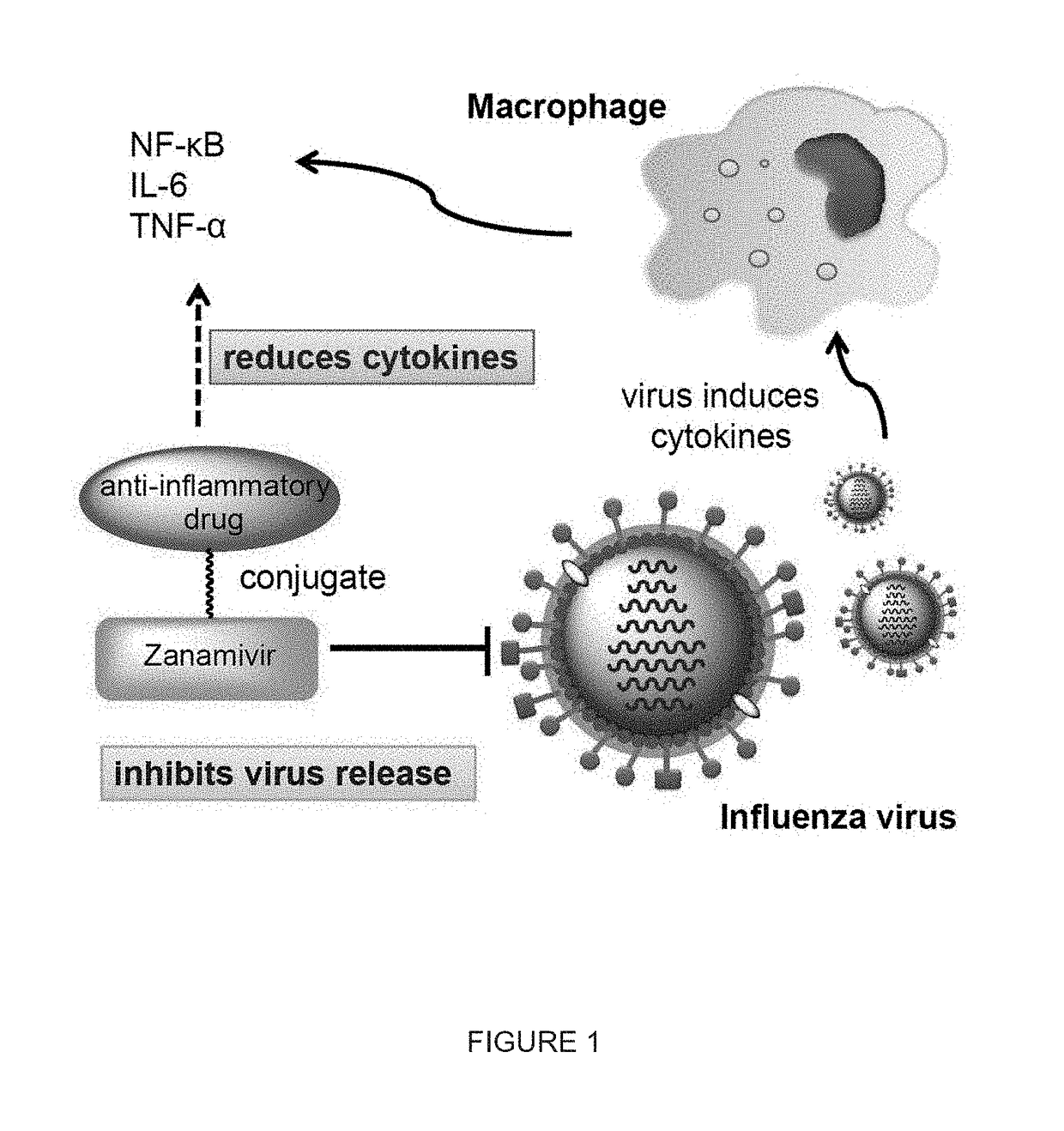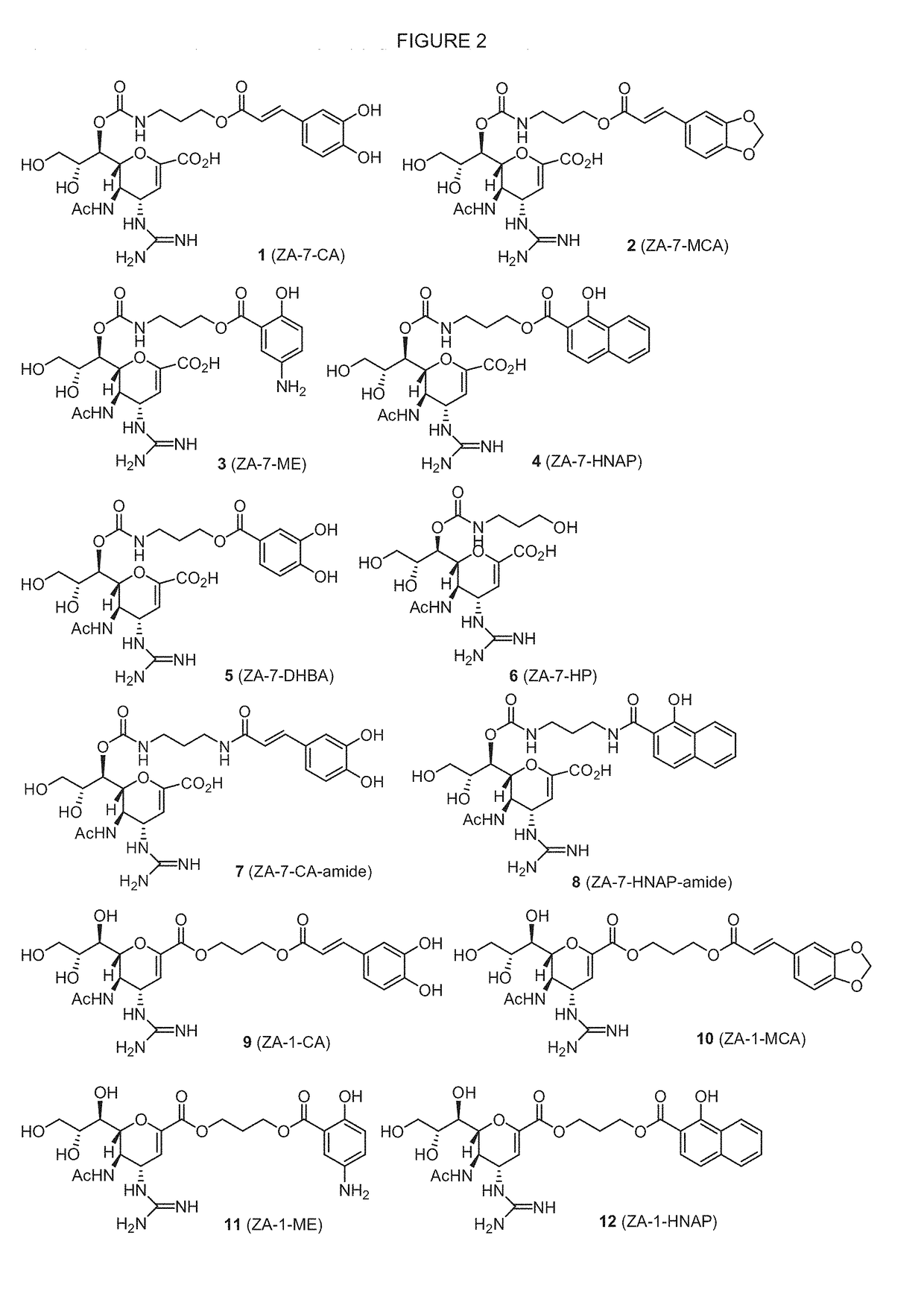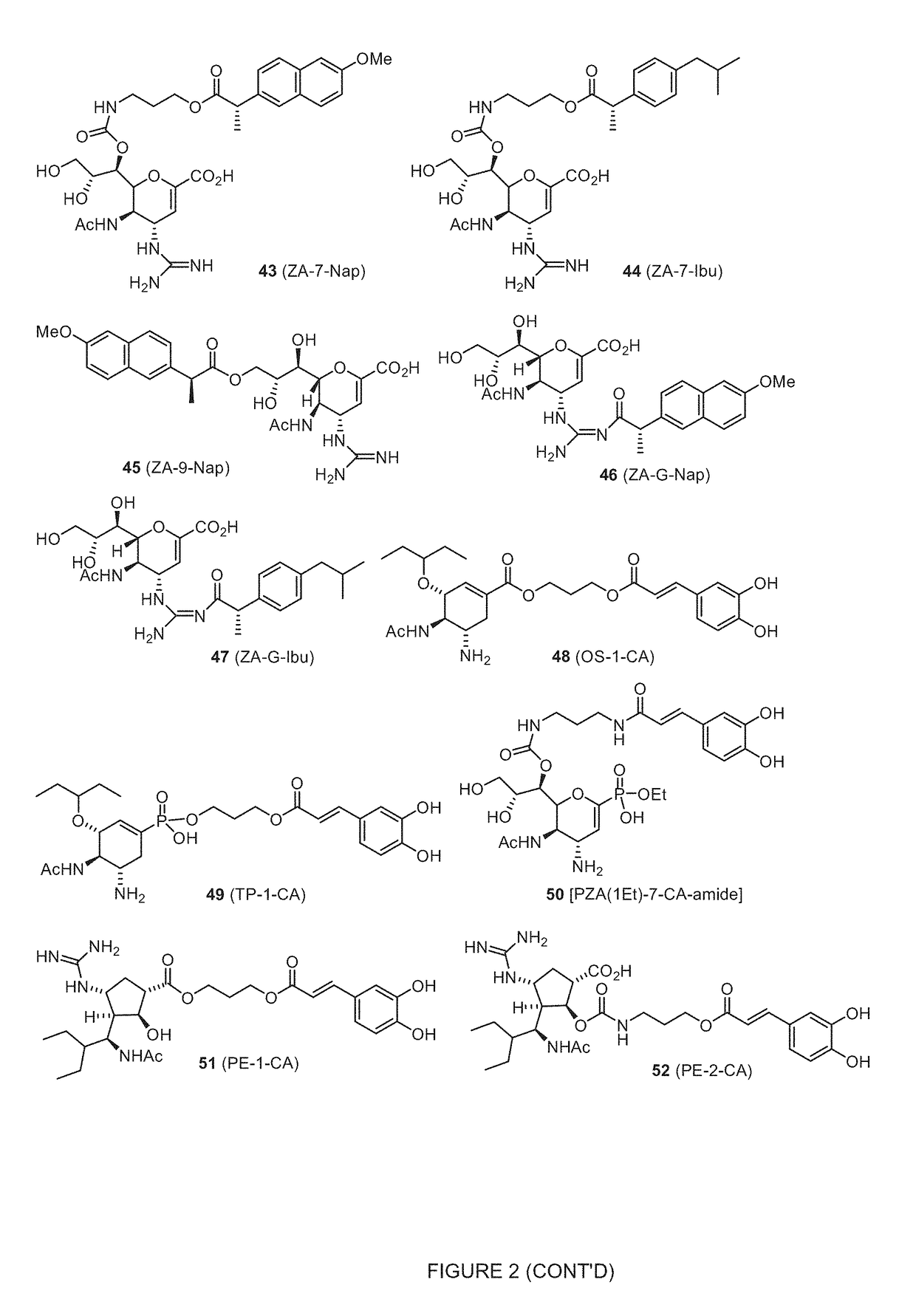Enhanced anti-influenza agents conjugated with anti-inflammatory activity
a technology of anti-inflammatory activity and enhanced anti-influenza agent, which is applied in the direction of biocide, group 5/15 element organic compound, drug composition, etc., can solve the problems of high mortality of human infected by influenza h5n1, severe health problems, and the inability to achieve monotherapy with a single antiviral drug for influenza to achieve the effect of limited
- Summary
- Abstract
- Description
- Claims
- Application Information
AI Technical Summary
Benefits of technology
Problems solved by technology
Method used
Image
Examples
example 1
tation
[0265]Melting points were recorded on a Yanaco or Electrothermal MEL-TEMP 1101D apparatus in open capillaries and are not corrected. Optical rotations were measured on digital polarimeter of Japan JASCO Co. DIP-1000. [α]D values are given in units of 10−1 deg cm2 g−1. Infrared (IR) spectra were recorded on Nicolet Magna 550-II or Thermo Nicolet 380 FT-IR spectrometers. UV-visible spectra were measured on a Perkin Elmer Lambda 35 spectrophotometer. Nuclear magnetic resonance (NMR) spectra were obtained on Bruker Advance-400 (400 MHz) spectrometer. Chemical shifts (δ) are given in parts per million (ppm) relative to δH 7.24 / δC 77.0 (central line of t) for CHCl3 / CDCl3, δH 4.80 for H2O / D2O, δH 3.31 / δC 48.2 for CD3OD, or δH 2.49 / δC 39.5 for DMSO-d6. The splitting patterns are reported as s (singlet), d (doublet), t (triplet), q (quartet), m (multiplet), dd (double of doublets) and br (broad). Coupling constants (J) are given in Hz. Distortionless enhancement polarization transfer (...
example 2
Materials
[0266]All the reagents and solvents were reagent grade and were used without further purification unless otherwise specified. All solvents were anhydrous grade unless indicated otherwise. CH2Cl2 was distilled from CaH2. All non-aqueous reactions were carried out in oven-dried glassware under a slight positive pressure of argon unless otherwise noted. Reactions were magnetically stirred and monitored by thin-layer chromatography on silica gel using aqueous p-anisaldehyde as visualizing agent. Silica gel (0.040-0.063 mm particle sizes) and LiChroprep® RP-18 (0.040-0.063 mm particle sizes) were used for column chromatography. Flash chromatography was performed on silica gel of 60-200 m particle size. Molecular sieves were activated under high vacuum at 220° C. over 6 hours. Purity of compounds 1-12 was assessed to be ≥95% by HPLC (Agilent HP-1100) with detection at 254 or 360 nm wavelength.
example 3
l Materials
[0267]Influenza virus A / Vietnam / 1194 / 2004 RG14 (H5N1) and A / California / 7 / 2009 (H1N1) were from the Center for Disease Control and Prevention in Taiwan and influenza A / WSN / 1933 (H1N1) was from Dr. Shin-Ru Shih in Chang Gung University in Taiwan. All Viruses were cultured in the allantoic cavities of 10-day-old embryonated chicken eggs for 72 h, and purified by sucrose gradient centrifugation. Madin-Darby canine kidney (MDCK) cells were obtained from American Type Culture Collection (Manassas, Va.), and were grown in DMEM (Dulbecco's modified Eagle medium, GibcoBRL) containing 10% fetal bovine serum (GibcoBRL) and penicillin-streptomycin (GibcoBRL) at 37° C. under 5% CO2.
Example 4: Determination of Influenza Virus TCID50
[0268]The TCID50 (50% tissue culture infectious dose) was determined by serial dilution of the influenza virus stock onto 100 μL MDCK cells at 1×105 cells / mL in 96-well microplates. The infected cells were incubated at 37° C. under 5.0% CO2 for 48 h and add...
PUM
| Property | Measurement | Unit |
|---|---|---|
| concentrations | aaaaa | aaaaa |
| w/w | aaaaa | aaaaa |
| diameter | aaaaa | aaaaa |
Abstract
Description
Claims
Application Information
 Login to View More
Login to View More - R&D
- Intellectual Property
- Life Sciences
- Materials
- Tech Scout
- Unparalleled Data Quality
- Higher Quality Content
- 60% Fewer Hallucinations
Browse by: Latest US Patents, China's latest patents, Technical Efficacy Thesaurus, Application Domain, Technology Topic, Popular Technical Reports.
© 2025 PatSnap. All rights reserved.Legal|Privacy policy|Modern Slavery Act Transparency Statement|Sitemap|About US| Contact US: help@patsnap.com



